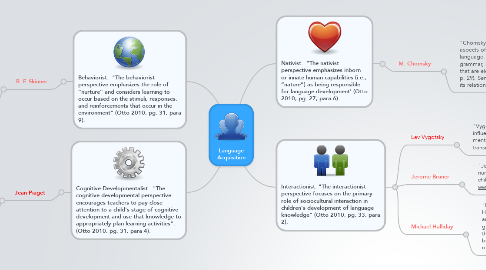
1. Behaviorist. "The behaviorist perspective emphasizes the role of “nurture” and considers learning to occur based on the stimuli, responses, and reinforcements that occur in the environment" (Otto 2010, pg. 31, para 9).
1.1. B. F. Skinner
1.1.1. "Skinner called his particular brand of behaviorism "Radical" behaviorism. Radical behaviorism is the philosophy of the science of behavior. It seeks to understand behavior as a function of environmental histories of reinforcing consequences", as stated on www.wikipedia.com
2. Nativist. "The nativist perspective emphasizes inborn or innate human capabilities (i.e., “nature”) as being responsible for language development' (Otto 2010, pg. 27, para 6).
2.1. M. Chomsky
2.1.1. "Chomsky's work has involved identifying grammatical aspects of language and describing the rule systems for using language. Chomsky has defined this rule system, or universal grammar, as “the system of principles, conditions, and rules that are elements or properties of all human languages” (1975, p. 29). Semantic knowledge is also considered with respect to its relation to syntax" (Otto 2010, pg. 28, para 3).
3. Interactionist. "The interactionist perspective focuses on the primary role of sociocultural interaction in children's development of language knowledge" (Otto 2010, pg. 33, para 2).
3.1. Lev Vygotsky
3.1.1. "Vygotsky's basic premise was that language development is influenced by the society in which the individual lives: “higher mental functions are socially formed and culturally transmitted” (Otto 2010, pg. 33, para 2).
3.2. Jerome Bruner
3.2.1. "Jerome Bruner proposed a theory that combined both nature and nurture elements. He argued for the importance of language input that children received from their primary care-givers", according to www.ehow.com website.
3.3. Michael Halliday
3.3.1. "Halliday is notable for his grammatical theory and descriptions. Halliday's grammar is not just systemic, but systemic functional. He argues that the explanation of how language works "needed to be grounded in a functional analysis, since language had evolved in the process of carrying out certain critical functions as human beings interacted with their ... 'eco-social' environment", as stated on www.wikipedia.com website.
4. Cognitive Developmentalist. "The cognitive developmental perspective encourages teachers to pay close attention to a child's stage of cognitive development and use that knowledge to appropriately plan learning activities". (Otto 2010, pg. 31, para 4).
4.1. Jean Piaget
4.1.1. "To Piaget, cognitive development was a progressive reorganization of mental processes as a result of biological maturation and enviromental experience. Children construct an understanding of the world around them, then experience discrepancies between what they already know and what they discover in their environment", as stated on www.simplypsychology.org
